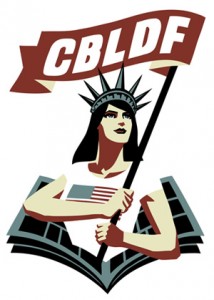 Shortly after the Newtown shootings, a New Jersey high school student found himself in juvenile detention because of doodles in his notebook. This arrest has a disturbing familiarity for CBLDF: In 2004, we helped successfully clear a high school student who had been unjustly arrested and prosecuted for the poetry he wrote.
Shortly after the Newtown shootings, a New Jersey high school student found himself in juvenile detention because of doodles in his notebook. This arrest has a disturbing familiarity for CBLDF: In 2004, we helped successfully clear a high school student who had been unjustly arrested and prosecuted for the poetry he wrote.
Last week, CBLDF reported on the arrest of the New Jersey student, who was arrested for the possession of explosive materials after police searched his home in response to a complaint from high school officials about doodles of weapons in his notebook. Sadly, this type of case is not new. In 2004, CBLDF helped rally an all-star roster of authors — including Neil Gaiman, Harlan Ellison, Greg Rucka, Peter Straub, Michael Chabon, J.M. Coetzee, and more — to the defense of George T., a California student who was unjustly convicted of making a criminal threat based on the content of poems he wrote and shared with a classmate. Thanks in part to the efforts of CBLDF and the community of organizations and authors who spoke out on George T.’s behalf, the California Supreme Court overturned the conviction.
George T. was new to his high school when he shared his poems with another student. George had disciplinary problems at previous schools, but he had never exhibited violent behavior. In the poetry, which George introduced as describing himself and his feelings, the author calls himself dangerous and evil. George further wrote that he could be “the next kid to bring guns to kill students at school.” The other student was frightened by the poetry, and told her parents and teacher about it. In turn, the teacher contacted authorities, who arrested George and charged him with making a criminal threat. A juvenile court convicted him and sentenced him to 100 days in juvenile detention, and the Court of Appeal upheld the conviction, rejecting George’s claim that the poetry was protected by the First Amendment.
CBLDF joined the ACLU of Northern California, NCAC, several authors, and other free expression advocacy organizations in filing an amicus brief to the California Supreme Court on behalf of George. The brief made the following argument:
This case raises fundamental issues of freedom of expression in the creative arts. Amici, who are literary artists and organizations supporting literary artists, do not contend that a poem can never constitute a true threat that lies outside of First Amendment protection. We do contend that creative works such as a poem or painting cannot, on their face, constitute a true threat. Only the circumstances surrounding the communication of a poem or other creative work can transform it from protected expression into an unprotected true threat. [Download a PDF of the full brief here.]
The California Supreme Court unanimously overturned the conviction, concluding that the lower courts had not sufficiently established that a criminal threat had been made and upholding George T.’s First Amendment right to free expression. The court’s decision can be viewed here.
George T.’s right to free expression was upheld, but it remains to be seen if the New Jersey student will have his First Amendment rights upheld. CBLDF will be following the story.
Please help support CBLDF’s important First Amendment work by making a donation or becoming a member of CBLDF!
Betsy Gomez is the Web Editor for CBLDF.